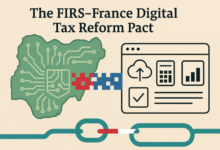Financial inclusion with embedded credit: Expert advises banks, financial players
 A financial expert, Mrs Luz Maria Salamina, on Thursday advised banks and other financial players to embrace the new opportunities represented in embedded credit to drive financial inclusion in Nigeria.
A financial expert, Mrs Luz Maria Salamina, on Thursday advised banks and other financial players to embrace the new opportunities represented in embedded credit to drive financial inclusion in Nigeria.
Salamina, who is a Lead Financial Sector Specialist, World Bank Group and Secretariat of the International Committee on Credit Reporting, gave the advice at a stakeholder’s conference in Lagos.
The conference was organised by the Chartered Institute of Bankers of Nigeria (CIBN) in collaboration with Credit Bureau Association of Nigeria (CBAN).
The News Agency of Nigeria (NAN) reports that the conference had as its theme,“Enhancing Financial Inclusion in Nigeria: Changing the Narrative.”
NAN reports that embedded credit is the seamless integration of lending-as-a-feature into digital platforms.
In embedded credit, credit products are integrated in the non-financial companies businesses.
For example, retailers or marketplace allow the buyers to defer payments at the point of sale without having to go to a bank or to a lending institution to apply for a loan.
“In Nigeria, embedded credit has supplied already an estimated N278 billion or $689 million as of 2021 and it is estimated that the demand for embedded credit in Nigeria will be N900 billion ($2.2 billion).
“You can see what the most popular embedded credit issued already have offered Nigeria –the Buy now Pay later which is the most popular one, Merchant Cash Advances, Vehicle Finance, Trade Finance, Inventory Finance and BNPL,’’she said.
The financial expert said that some embedded credit providers appeared to be driving financial inclusion by employing alternative data and alternative scoring models to target thin to no file customers.
She also said that there were some proof already that the embedded credit contributed to financial inclusion like providing micro loans through its mobile app platform to farmers among other things, and mainly to women.
However, Salamina said, “there is still not enough evidence or enough data to measure the impact, growth and sustainability, but, these are good signs that something good is happening for financial inclusion.”
Also speaking, the Chairman of CIBAN, Dr Jameelah Sharrief-Ayedun, said that Nigeria was still far from financial inclusion target of 80 per cent, though there had been some proof in the number of people opening account.
“The virtual gathering today has demonstrated our vision of ensuring that financial inclusion is promoted in Nigeria which will subsequently stimulate a stronger economy for all stakeholders.
“Nigeria has seen a proof in the number of people opening account, people taking out loans from one and even several financial institutions and the influx of Fintech apps. More than ever before, we are witnessing a level of progress being made in the financial sector.
“However, we are still far from Nigeria’s financial inclusion target of 80 percent; in fact 36 percent of Nigerians adult are still not financially included.
“You can segments that any way you want by sex, by age, region, any part of the pyramid, they are not even on the radar.
“This demographic barely has traceable identities, not to mention having a footprint in the financial sector. This makes it very difficult for them to get access to credit which is hearkened to a distant dream from being able to accumulate wealth.
“So clearly it is time to change the narrative,’’ Sharrief-Ayedun, also the Managing Director, Credit Registry said.
Earlier,the CIBN Registrar, Oluseye Awojobi, represented by Mr Babatunde Apena, Director, E-Learning/ Learning and Development, said that the theme of the conference was aimed at evoking an in-depth discussion on impact of access to Micro,Small and Medium Enterprises(MSMEs).
He said that the subject matter was also aimed at exploring strategic measures that could improve business financing through credit reporting, adding that the surge on financial inclusion had been an age long challenge with distinctive implication for economic development.
“ Individuals without access to basic bank facilities are left rightly to save, manage risk, take an adventure into business and also invest among other things.
“Likewise businesses without access to useful and affordable financial product are less likely to expand their operations, employ more labour and generate more revenue.
“Indeed the role of financial inclusion as a means of spurring MSME growth cannot be over emphasised,’’ Awojobi said.










